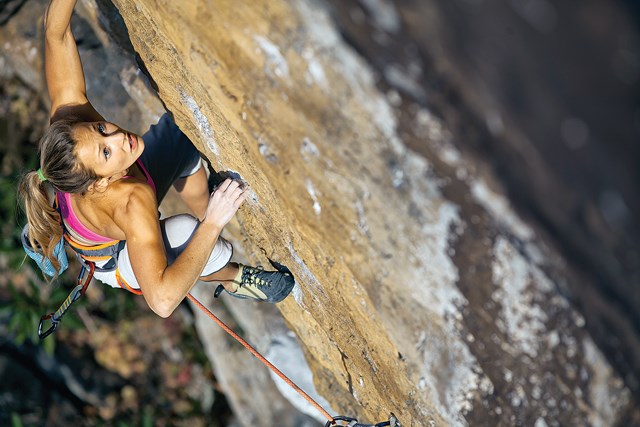Sasha DiGiulian, Vancouver International Mountain Film Festival, Opening Night at Centennial Theatre, tonight at 7:30 p.m. For more visit vimff.org.
The mother put the baby in a crib. When she returned to check on her child, the baby was on the floor.
Sasha DiGiulian had climbed out.
"I climbed everything," she states, recalling her dexterity on the monkey bars, in an email interview. "My brother was also an avid hockey player and I would climb the rafters at the rink! The joke was 'look up' to find me."
DiGiulian is often called North America's greatest female rock climber.
The 21-year-old recently made headlines by becoming the first woman to scale the Bellavista in the Italian Dolomites.
The mountain's expressionless cliff faces look like limestone Teflon. DiGiulian is one of only a handful of climbers to scale the multi-pitch, avalanche-prone rock.
While the wind howled, DiGiulian dug her pink fingernails into handholds and braced her heel and toe in the gaps offered by the mountain.
"I love the feeling of complete joy when you accomplish something that you have worked hard towards realizing. The feeling that the dream world seems to blur with reality and it is difficult to discern between the two," she writes.
Performing a first female ascent opens the floodgates for young women interested in climbing, according to DiGiulian.
"I want to push my physical boundaries and explore what I am capable of because I believe that that is undefined."
She is scheduled to discuss her climb and the ecstasy of reaching the peak on the opening night of the Vancouver International Mountain Film Festival.
The festival consists of 79 films from four continents culled from approximately 180 submissions, according to programmer Tom Wright.
Many of the entries were visually arresting, but Wright says the jury put an emphasis on narrative.
"It's the story that truly makes the film," he says.
A few entrants bring a wealth of filmmaking experience to the festival while others are adventurers who took a camera along for the ride.
"We have plenty of films from people every year - they're not filmmakers really, they're just general adventurers and they come back from these trips with these stories and they want to document them," Wright says.
Vancouver's Debora De Napoli chronicles her journey from cubicle to mountaintop in her film Life Cycle Project.
De Napoli hops astride a mountain bike and heads to the hills while waiting to see if she has the ovarian cancer gene.
"She is now calling herself a filmmaker, but this is her first film," Wright says.
While some movies gain depth from introspection, others take a global view.
North of the Sun follows two young men who spent nine months in a driftwood cabin in a remote arctic island in northern Norway.
"It's an environment film but with some surfing and snowboard action too," Wright says.
For some adventurers, their movies are like the scars that prove the past is real.
"Storytelling has always been an important part of the outdoor industry," Wright explains. "You go out into these environments and chase this adventure and come back with these stories, and it's kind of a shame not to share them with people."
Since its origins as a mountain climbing festival, VIMFF has grown into an international adventure festival with a scheduled stop in China this year.
Festival director Alan Formanek recalls when The Ridge and Denman Cinemas were key venues.
"We used the Denman cinemas.. .. It was a fantastic venue downtown that got shut down and transferred into a dollar store," he says.
"We haven't been really affected by these theatres shutting down," he says. "Our main venues are in North Van."
The festival relies on support from the City and District of North Vancouver, but a few district councillors recently expressed ambivalence about continuing the current funding structure.
"The issue here is that the funding was originated as seed funding. .. since then we have been receiving funding," Formanek said. "It is no longer seed funding. It hasn't been seed funding for 15 years, but some councillors still did see it as seed funding."
The North Shore is the place where you can step out of a theatre and get a great view of the mountains, making it a fitting site for the festival, according to Formanek.
"The festival was born in North Van, so we'd like to keep doing it here."



